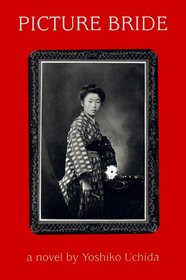I really enjoyed this book. Probably because I knew a family, living in ND, who owned a business here and were forced to leave their home and live in a detention camp.
A saga that spans the years 1917 to 1943 about one Japanese emigre to America-her life experiences and those of her friends and community. A fascinating tale of an immigrant experience made the more dramatic by the American response after Pearl Harbor
Carrying a picture of Taro TAkeda, whom she is to marry but has yet to meet, 21-year old Hana Omiya leaves Japan and arrives in San Francisco as one of several hundred Japanese "picture brides" whose arranged marriages brought them to America in the early 1900's. In Picture Bride, which spans the years from 1917 to 1943, Yoshiko Uchida provides an intimate glimpse into the lives of these Japanese immigrant women.
When Hana meets Taro, he is not the handsome, prosperous shopkeeper whe was led to expect. Yet this disappointment is only the first of many Hana must face: rejection by a hostile white society; thwarted love for another man; demeaning employment as a domestic ervnt, and the greatest loss of all, alienation from her daughter, Mary, who, like so many children of Japanese immigrant parents, feels ashamed of her cultural heritage and forsakes it in an attempt to assimilate herself into American schooling and society.
Yet although Ms. Uchida's portrayal of Hana Omiya's life is faithful to history, it is far from being bitter or depressing. Hana and Taro's friends, among them the leaders of their community, are people who encourage and enable strong bonds to form. They bolster one another with a sense of humor and have a spiritual wealth they offer freely, rejoicing in the simple things that life offers.
When Hana meets Taro, he is not the handsome, prosperous shopkeeper whe was led to expect. Yet this disappointment is only the first of many Hana must face: rejection by a hostile white society; thwarted love for another man; demeaning employment as a domestic ervnt, and the greatest loss of all, alienation from her daughter, Mary, who, like so many children of Japanese immigrant parents, feels ashamed of her cultural heritage and forsakes it in an attempt to assimilate herself into American schooling and society.
Yet although Ms. Uchida's portrayal of Hana Omiya's life is faithful to history, it is far from being bitter or depressing. Hana and Taro's friends, among them the leaders of their community, are people who encourage and enable strong bonds to form. They bolster one another with a sense of humor and have a spiritual wealth they offer freely, rejoicing in the simple things that life offers.




